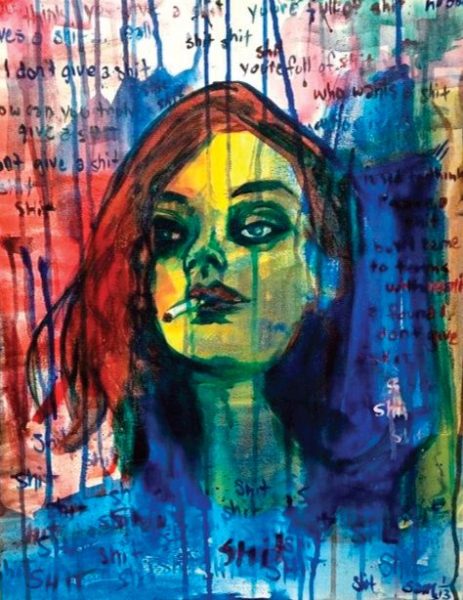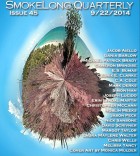Let’s talk process. Where did this piece come from?
It’s a collage built around memory and random imagery. Which is not an unusual process for my writing. This piece was very intuitive, which I love, because it’s so easy to write when it just feels right to use a certain word or theme. And the other really cool thing about working intuitively is that lots of times I’ll have a fierce desire to use a certain image without knowing why, and then later I’ll realize that it actually makes perfect sense. I include a lot of references to music in my writing, and this story is no exception. The title is also the title of a Tom Waits song that seemed fitting. But I like that the title also functions on other levels. By invoking “the part you throw away,” you are also invoking the idea of “the part that you hold close.” And my main character here is trying to come to terms with both ideas while also accepting that this love interest from her past has thrown her away, to the best of her knowledge.
I used to coordinate a contest for works that straddled the “fine line” between poetry and sudden fiction/essay. How would you categorize this piece? And if it’s one genre, why is it not the other(s)?
I definitely consider this flash fiction, or sudden fiction if you prefer. I identify it that way mostly because that was my intent when writing it. To tell a story. And of course fiction can do more than tell a story, and poetry can tell stories, too. But if my primary goal is to tell a story, I will go to fiction because I am generally not that interested in poetry that is first and foremost narrative.
I Googled you and discovered that you have beautiful red hair and you’re a witch. I don’t know what to ask about the beautiful red hair, so I’d like to focus briefly on witchcraft. Could you describe how ritual informs your writing?
I don’t believe in making a lot of distinctions between the magickal and the mundane. To me, that seems very counter to what a lot of witchcraft is about, ideally. One thing that is sacred among religions but is especially true of Wicca is the idea of immanence, that we can always access our relationship with the divine, whether we’re on the bus or in a gorgeous field. Even though I don’t find formal, ceremonial ritual necessary either for spiritual contact or writing, I am very much a creature of ritual in general. Sometimes that ritual is a way of having a dialogue with the divine and sometimes that ritual is just a bizarre conflagration of circumstances that I insist on employing. Sometimes I’ll go to write and be totally convinced that in order to get a piece to come out right, I need to put on ’80s pop songs and look at pictures of Freud. That particular piece never happened, though.
Sometimes when my writing really sings, I credit … something, a big force that is unexpectedly generous at times. I think it may be God, or the collective unconscious; some might call it the muse. I was wondering if you ever receive gifts in your writing that you credit to a larger intelligence–and would you say that this greater intelligence is the same as magick?
I have gone back and forth about this one myself for a long time. I can certainly remember writing moments that were inexplicably perfect, like the time in Boston I was on the subway and this whole short story just fell into my head and I had to hurry home at my stop so I wouldn’t lose track of it. That was a blessing. When things like that happen, I usually don’t know who or what to thank, and I realize it could just be myself. Now I just say Thank you.
But I also think that sometimes we don’t know what’s in our own heads, and part of the reason I employ ridiculous rituals is to get at the unknown that is within myself. Like, I have been working on a modern-day story where Jesus is a character. And He has to be there. But when I realized this meant I would have to come up with dialogue for Jesus, I had no idea what to do. So I made a Ouija board (by writing the alphabet on paper and using a quarter as a pointer) and said that I wanted to get in touch with the part of myself that already knew the answers. I got a few good lines out of it.
Is it magic? Possibly, but we are capable of facilitating our own magic, so I try to just be grateful.
When you talked about the arpeggios in the practice rooms, I think I spotted another music nerd. Do I have that right? Were you in band and choir and stuff? Or were you artsy-fartsy? A jock? What was your clique, and do you recognize that part of yourself now?
Haha, not really a music nerd. I took piano lessons for a few years but they seemed too formulaic so I ended up just teaching myself pieces that I wanted to learn. Which could be tricky because I have exceptionally small hands, and, well, Rachmaninoff did not have this limitation. I think my clique was a clique of one. I was the smart, artsy, feminist weirdo. In high school we had to do projects around Lord of the Flies, and I wrote an absurdist puppet show retelling in which Simon was played by a puppet of Paul Simon, Piggy was played by a stuffed pig, and Jack was played by a picture of a hydraulic jack. It didn’t occur to me at the time that nobody would get it. Which is, of course, what happened.
Oh, yes, and there was also the time in eleventh grade when I made a mix tape for a boy I liked, only he was super normal and I put, like, PJ Harvey on it.
I really haven’t changed a bit, except now I occasionally meet people who like my puppet shows.



 The core workshop of SmokeLong Fitness is all in writing, so you can take part from anywhere at anytime. We are excited about creating a supportive, consistent and structured environment for flash writers to work on their craft in a community. We are thrilled and proud to say that our workshop participants have won, placed, or been listed in every major flash competition. Community works.
The core workshop of SmokeLong Fitness is all in writing, so you can take part from anywhere at anytime. We are excited about creating a supportive, consistent and structured environment for flash writers to work on their craft in a community. We are thrilled and proud to say that our workshop participants have won, placed, or been listed in every major flash competition. Community works.